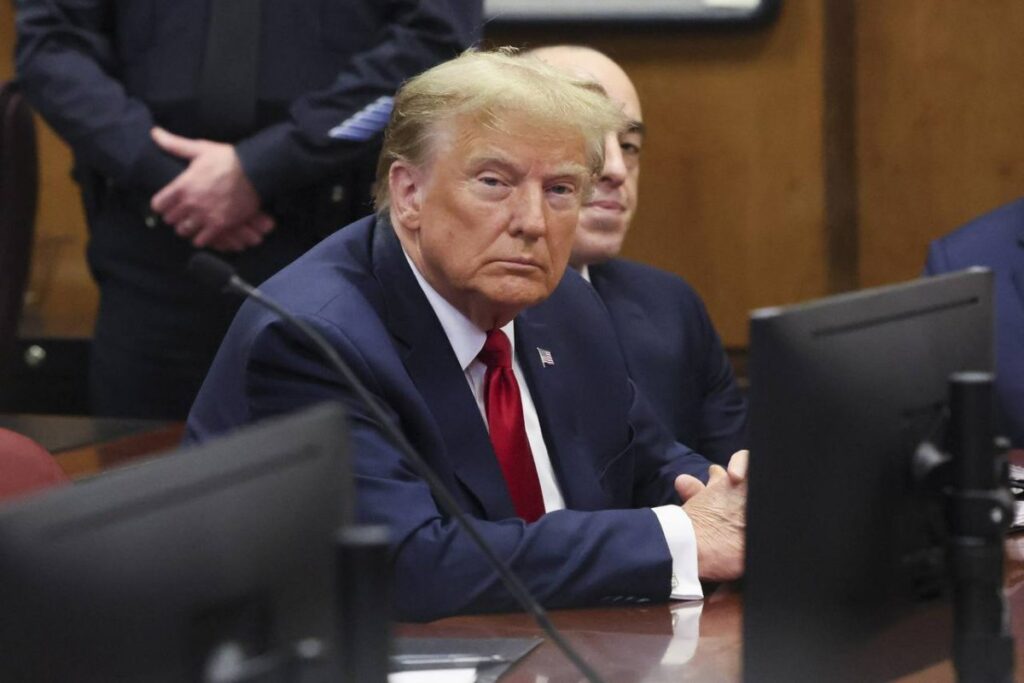A new poll has shown that most Americans oppose Former President Donald Trump’s immunity claims from prosecution. According to the survey, seventy percent of American voters and 48% of Republicans reject Trump’s claim to immunity. Hence, respondents say he should face criminal prosecution for acts committed in office.
In the Ipsos and Politico Magazine poll, 11% backed the former president and presumptive Republican nominee’s claim. They support his claims, as expressed in his federal election subversion case, which has reached the Supreme Court.
They conducted the poll from March 8-10, interviewing 1,024 adults, age 18 or older, online. The poll reportedly has a margin error of plus or minus 3.3 percentage points for all respondents. According to reports, this is the third poll on the Trump prosecutions that the outlet has conducted with Ipsos.
“The result is a positive sign for the constitutional sensibilities of the American public,” former federal prosecutor Ankush Khardori wrote. Khardori, who called Trump’s argument for immunity “absurd,” echoed a view widely held among law professors.
ALSO READ: Trump Scores Rare Victory in Court As Georgia Judge Dismisses 3 Criminal Counts Against Him
However, the poll also produced what Khardori called a “sobering” poll result. According to the poll results, nearly half of respondents (46%) did not trust the Supreme Court. The respondents doubted that the Supreme Court would issue “a fair and nonpartisan ruling” in the immunity case.
Aided by Senate Republicans, Trump appointed three right-wingers to the court in his four years in power. Consequently, the court, tilted 6-3 to the right, has delivered major Republican victories. These include the removal of federal abortion rights and rulings on gun control, affirmative action, and more.
However, in February 2024, the court stoked uproar when it said it would hear oral arguments over Trump’s immunity claim. The decision delayed trial over four charges from Trump’s attempt to overturn Joe Biden’s win in the 2020 presidential election.
POLL — Should Donald J. Trump Be Allowed to Run for Office?
Hence, they have postponed the likely court dates until polling day this year. Furthermore, the right-wing-dominated court dismissed state challenges to Trump’s place on the ballot under the 14th Amendment, a measure approved after the Civil War, for inciting the January 6, 2021, insurrection.
As a result, the Supreme Court’s approval rating remains at historic lows. And Trump, on the other hand, faces 84 different criminal charges. The charges include ten over election subversion in Georgia and 34 over hush-money payments in New York.
Furthermore, the former president faces 40 charges for retaining classified information after leaving office. However, having floored Republican opponent Nikki Haley in the primaries, Trump is employing delaying tactics on all legal fronts.
ALSO READ: Kremlin Mouthpieces Say Trump is “Unhinged” Amid Viktor Orbán’s Visit
In the Politico/Ipsos poll, 59% of respondents said Trump should stand trial in Washington. Also, the voters said he should stand the federal election subversion trial before election day. Similarly, fifty percent (but only 14% of Republicans) said they believed Trump was guilty in the New York hush-money case.
Like the election subversion case, the Supreme Court ruling has delayed the hush-money case. However, it might be the first to produce a trial. In the poll, 44% of respondents said a conviction would not impact their likelihood of supporting Trump.
Conversely, more than a third (36%) of independent voters said a conviction would impact their support for him. The independent voters claim a conviction will make them less likely to vote for Trump in November.
You Might Also Like:
Authorities Report Three Separate Shootings Within 1 Hour in Jacksonville Beach
Experts Claim Judge Arrived at DA Fani Willis Ruling Through Unproven Claims
Christine Blasey Ford Tells Her Story in New Memoir
President Joe Biden Signs Executive Order To Expand Women’s Health Research
Abbott Tells Musicians Who Pulled Out of SXSW Festival Not to Return to Texas
